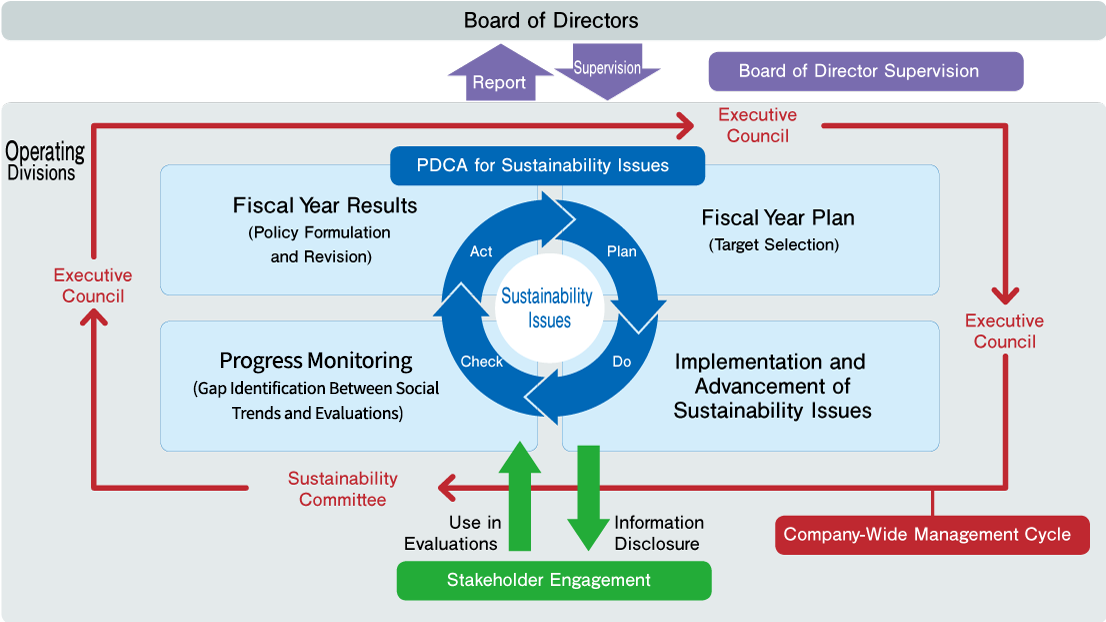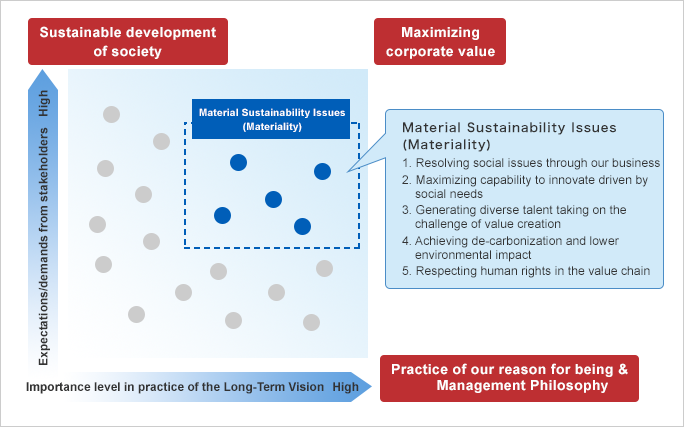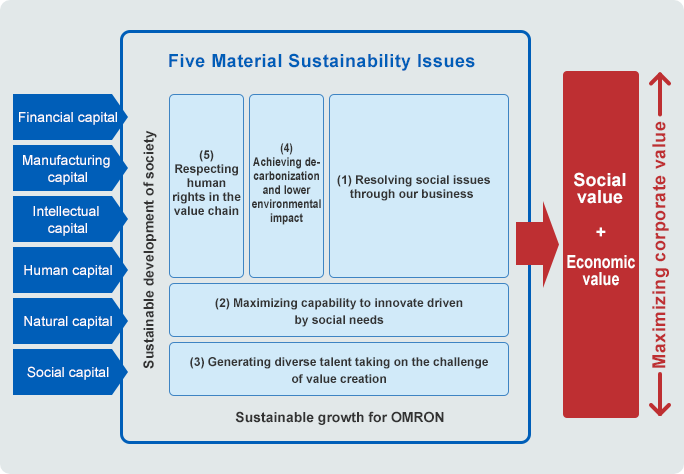Sustainability Policy
Sustainability Policy
We believe a business should create value for society through its key practices.
We are committed to sustainably increasing our long-term value by putting Our Mission and Values into practice.
- We uphold a long-term vision in our business practices to create solutions to society's needs.
- We operate as a truly global company through our fair and transparent management practices.
- We cultivate strong relationships with all of our stakeholders through responsible engagement.
- * OMRON’s Sustainability Policy reflects the same meaning and content as declared by our Management Philosophy based on the OMRON Principles. Namely, "We are committed to sustainably enhancing our long-term corporate value by putting the OMRON Principles into practice."
Fundamental Policy
OMRON's reason for being is to create social value through business and continue to contribute to the development of society. To achieve this, we believe it is important for OMRON to identify material sustainability issues on which to focus, incorporate them into our medium-term and long-term strategies, set specific initiatives and targets, and implement them through our business. For OMRON, sustainability means pursuing both social and corporate sustainability. By fully integrating our key sustainability issues with our Long-Term Vision and Medium-Term Management plan, we will continue to strive for the sustainable development of society and the sustainable growth of OMRON.
Company-wide Management Structure to Promote Sustainability Goals
We have established a company-wide management structure to implement our sustainability initiatives on a global basis. The Board of Directors has established the Sustainability Policy and serves in a monitoring and supervisory function for efforts to address material sustainability issues. We have adopted a third-party assessment based on sustainability indicators as one of our KPIs when determining medium- to long-term performance-linked compensation for internal Directors and Executive Officers for the Medium-Term Management Plan period. By adopting these third-party sustainability assessments, we enhance fairness and transparency. Furthermore, by disclosing our Sustainability Policy, targets, KPIs, and progress through various media, including our website and integrated reports, we are strengthening dialogue with our stakeholders, harnessing this to advance our initiatives.

Process for Identifying Material Sustainability Issues (Materiality)
We determined our material sustainability issues through a series of discussions amongst our management teams, based on suggestions from internal discussions and those with outside experts. This process has a key focus on the following three ideas. We proactively disclose information to our stakeholders and engage in responsible dialogue with them regarding our progress in achieving targets related to material sustainability issues, in accordance with our Sustainability Policy.
Key Focus Points in Identifying Material Sustainability Issues
- Management Philosophy and reason for being
- Backcasting from a society envisioned for 2030 and beyond
- Calls on companies to contribute to environmental and social sustainability
Identification Steps
Exploring the Long-Term Vision
Utilizing practice of our Management Philosophy, our management compass, and backcasting from a society envisioned for 2030 and beyond to identify factors of social change that affect the sustainable development of society and the Company, and to explore the direction of our Long-Term Vision
Organizing Focus Points
Based on the direction of our next Long-Term Vision, organizing focus points in identifying material sustainability issues
- Management Philosophy and reason for being
- Backcasting from a society envisioned for 2030 and beyond
- Calls on companies to contribute to environmental and social sustainability
Hypothesizing Material Sustainability Issues
Hypothesizing material sustainability issues along the following two axes:
- Importance level in practice of the Long-Term Vision, based on Step 2
- Stakeholder expectations and demands: Referring to international guidelines, e.g. The SDGs and the IIRC International Integrated Reporting Framework, as well as ESG assessment organizations
Discussion at Management Level
Frequent discussions at the Executive Council, chaired by the CEO and attended by Executive Officers
Dialogue with Stakeholders
Based on hypotheses, holding dialogues with institutional investors, experts, NPOs, etc. to confirm their expectations and demands on the Group and identify material sustainability issues
Set Long-Term and Medium-Term Goals
Formulating long-term and medium-term business and operational strategies and setting long-term and medium-term targets based on material sustainability issues
Discussion and Approval at Management Level
Deliberation and approval by the Board of Directors after discussions at the Executive Council, chaired by the CEO and attended by Executive Officers
- *Every year, the Executive Council discusses the need for changes to the material sustainability issues, progress toward the long-term and medium-term targets for the identified key sustainability issues, and the establishment of single-year targets and progress toward those targets. These discussions are then reviewed and approved by the Board of Directors.
Approach to Material Sustainability Issues

We identified five key sustainability issues that we judged to be particularly important for the sustainable development of society after confirming the expectations and requests of various stakeholders, including external evaluation organizations, our shareholders, including institutional and individual investors, customers, local communities, and NPO/NGOs.
Material Sustainability Issues (Materiality)
We at the OMRON Group have identified material sustainability issues, and incorporated them for the first time into our Long-Term Vision. Under SF2030, we aim to address the following five material issues.
- Resolving social issues through our business
Creating social value by resolving social issues through our business
- Maximizing capability to innovate driven by social needs
Evolving business models and expanding new business generation efforts
- Generating diverse talent taking on the challenge of value creation
Evolving human resources management to bring out the capabilities and skills of OMRON's diverse talent
- Achieving de-carbonization and lower environmental impact
By viewing climate change from the two aspects of opportunities and risks, practicing corporate social responsibility and building further competitive advantage
- Respecting human rights in the value chain
As part of our corporate social responsibility, exerting our influence for the respect of human rights for workers in the value chain and at OMRON
Addressing Material Sustainability Issues and Maximizing Corporate Value
Under SF2030, OMRON is evolving and promoting integrated initiatives to business growth and sustainability issues. The creation of social and economic value is realized through the aim of “solving social issues through business.” In order to achieve this, it is essential to create new businesses by innovation driven by social needs and to develop diverse human resources to support these new businesses. These will also lead to “OMRON’s sustainable growth.” In addition, decarbonization, reduction of environmental impact, and respect for human rights in the value chain have become essential corporate social responsibilities to promote the “sustainable development of society.” By addressing these five key sustainability issues, SF2030 aims to maximize corporate value by creating both social and economic value.

Furthermore, because the material sustainability issues were identified to achieve OMRON's long-term vision, the PDCA cycle for sustainability issues is incorporated in our Integrated Risk Management system.
Medium-to-Long-Term Goals of Material Sustainability Issues (Materialities)
| Material sustainability issues |
Medium-term targets (FY2024 targets) |
Long-term goals (SF2030 targets) |
①
Resolving social issues through our business |
- Sustainability-related sales*1, an indicator of contributions to the resolution of the three social issues: +45% vs. FY2021
- IAB:Customers adopting the innovative-Automation concept: 5,000 accounts (+100% vs. FY2021)
- OHQ:Blood pressure monitor unit sales: 94 million units (3-year total); users of remote patient monitoring services: 600,000 persons
- OSS:Energy management equipment connected: 50,000 units (3-year total)
- DMS:Unit sales of products contributing to the spread of new energy and high-speed communication: for DC-powered equipment, 60 million units; for high-frequency equipment, 170 million units (3-year total)
|
- The state of contributing to the sustainable development of society by resolving the social issues tackled Group-wide of achievement of carbon neutrality, realization of a digital society, and extension of healthy life expectancies from the social change factors focused on in SF2030: an aging population, climate change, and economic disparity among individuals
|
②
Maximizing capability to innovate driven by social needs |
- New businesses created: Three or more
|
- The state of continuously generating new businesses by demonstrating our capability to innovate driven by social needs in both existing and new business domains, through actions like evolving essential core technology development and incorporation into business models
|
③
Generating diverse talent taking on the challenge of value creation |
- Investment in human resource development: 6.0 billion yen
- Ratio of non-Japanese in key managerial positions overseas: 80% or more
- Increase the ratio of women in managerial roles to 18% or higher (globally)
- Realize employment of persons with disabilities at 28 overseas sites and maintain the ratio of employees with disabilities at 3% in Japan
- VOICE SEI*2:70P or higher
|
- The state of bringing diverse talent together where everyone can succeed, regardless of nationality, gender, or work style, where OMRON provides opportunities for its diverse talent to grow and evolves its human resources management to maximize their capabilities and skills
|
④
Achieving de-carbonization and lower environmental impact |
- Reduce total (direct/indirect) internal GHG emissions (Scope 1 and 2): 53% cut vs. FY2016
- Achieve Carbon Zero at all 76 sites*3 in Japan
- Implement energy-saving designs for new products in reducing GHG emissions from use of products sold (Scope 3)
- Implementing business model transformation, environmentally friendly design, collection and recycling, and sustainable procurement in response to transition to a circular economy
|
- The state of building further competitive advantage while solving social issues through reducing greenhouse gas (GHG) emissions in the value chain and establishing a resource recycling model
Long-term (2030) targets set for achieving OMRON Carbon Zero in 2050
- Reduce total (direct/indirect) internal GHG emissions (Scope 1 and 2): 65% cut vs. FY2016
- Reduce GHG emissions from use of products sold (Scope 3, Category 11): 18% cut vs. FY2016
|
⑤
Respecting human rights in the value chain |
- Conduct human rights due diligence in line with the UNGP*4
- Build a human rights redress mechanism into the value chain globally
|
- In line with the UN Guiding Principles on Business and Human Rights, the state of exerting our influence for the respect of human rights for workers not only at OMRON, but also in the value chain, and establishing a culture and system that does not permit or cause human rights violations
|
- *1Sales from focus businesses that contribute to "Achievement of carbon neutrality", "Realization of a digital society", and "Extension of healthy life expectancies"
- *2Sustainable Engagement Index, OMRON's employee engagement survey
- *313 production sites and 63 non-production sites (HQ, R&D, sales)
- *4The UN Guiding Principles on Business and Human Rights


